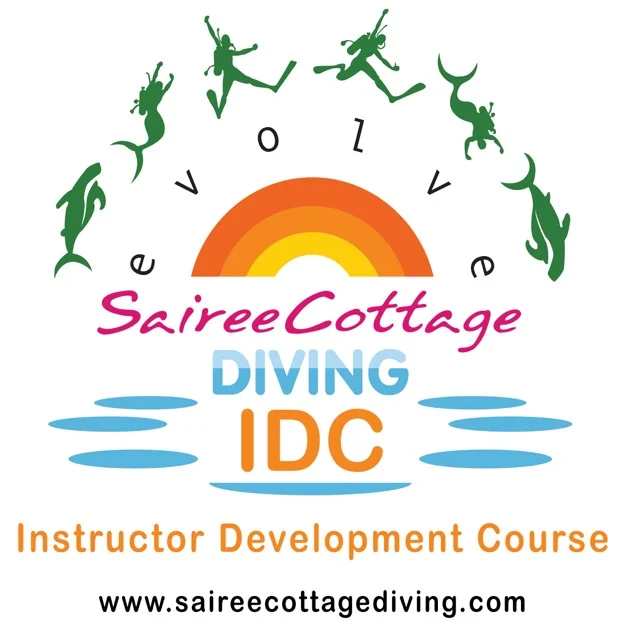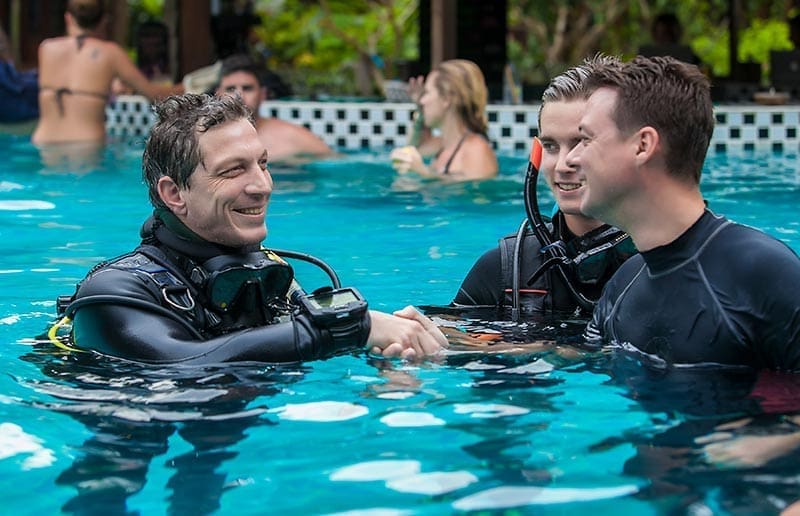Many dive professionals will quickly answer this question by saying:
“Yes. You should get more experience as a Divemaster before starting a PADI IDC. Try to get some experience by working in the dive industry or by completing a long Divemaster internship that can take a few months.”
It makes complete sense, but sometimes people give this answer too quickly as it really depends on many different factors to make that decision – to decide whether any particular individual is ready (or not) for the Instructor Development Course.
As a PADI Platinum Course Director I get this question all the time. Before I answer the question: “Do I need more experience as a Divemaster before starting the IDC?” I always ask for more information about the specific individual in order to give the most appropriate answer for that person.
These are some of my questions and considerations:
- Where did the person do his or her Divemaster training?
- I make an assessment of the potential candidate’s confidence and dive skills.
- I ask about dive experience and in what different conditions and where around the world.
- I discuss the practicalities of finances and considerations around living costs.
- Attitude.
- Any teaching skills and/or experience.
- And I’ll have a discussion about the high quality of our PADI Instructor Development Course.
Where did the person do his or her Divemaster training?
First of all I like to find out where and how someone completed their Divemaster course or if they are still in training as a Divemaster Candidate (DMC). There are many differences in how professional training is conducted in the Dive Industry; therefore the quality of Divemaster training can vary a lot dependant on location, dive centre and the quality of the Divemaster Instructor(s).
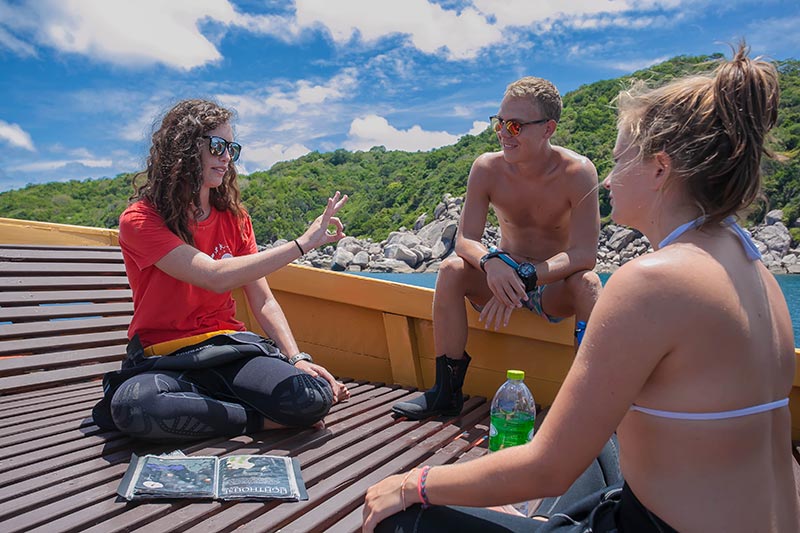
By creating clear worldwide training standards, PADI ensures high quality wherever you go, but in the real world that sometimes doesn’t happen because some dive centres and diving instructors deviate from these standards in order to earn more money and save time. Even if they do teach all the minimum Divemaster performance requirements according to the PADI Instructor manual it can still be inadequate depending on the abilities of the student.
In some locations around the world, the dive shop lacks a certain amount of real students signing up for recreational courses. In these cases, as part of their training, Divemaster Candidates will be assigned “fake students” (often Instructors pretending to be students) in order to role-play dive scenarios. This is not “real life” training and can effect the Divemaster candidate’s experience and quality of tuition significantly.
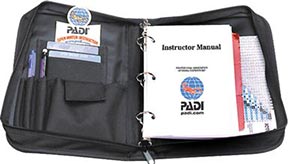
Another concern is that during the Divemaster course, candidates only need to complete one Skill Circuit (a demonstration of the key skills that appear in the Open Water course) to be able to comfortably demonstrate underwater skills to entry-level divers-in-training. In some places, the Divemaster trainee only needs to get a score as low as a 3 (out of 5) to pass.
In my opinion this will greatly affect the readiness of the Divemaster trainee or Divemaster when assessing whether or not they are ready to join the PADI IDC.
All in all you can complete a Divemaster course between 2 to 3 weeks or in some cases, when dive centres violate standards, even shorter. If you ask me is that person ready to start the Dive Instructor Development Course? Then I will most likely answer: “No” and I will recommend that person waits until they have gained more experience of real-life diving situations.
On the other hand there are many PADI Dive Centres and PADI Instructors around the world that go far beyond the minimum standards. Sairee Cottage Diving on Koh Tao in Thailand is one of them. These centres strive for excellence. Not only do they teach the PADI Divemaster course according to PADI standards, but they also add a lot of extra dive training, putting an emphasis on repetition. For example, here, during the Sairee Cottage Diving Divemaster Course we teach DMCs 3 Skill Circuits instead of just 1. We have our trainees assist 2 full PADI Open Water courses, 2 PADI Advanced Open Water courses and 1 to 2 PADI Rescue Diver courses instead of just assisting 1 Open Water and 1 ‘Continuing Education’ course.
At Sairee Cottage Diving we also add extra lectures for our DMTs like: Dive Physics, Dive Physiology, Dive Equipment, Decompression Theory, Recreational Dive Planning (RDP) Tables, the Dive Environment, Dive skills, Marketing, Eco and conservation, Project AWARE conservation, Risk Management classes…and the list goes on. Our Divemaster Candidates are always under supervision by our highly trained and hugely experienced staff and get regular and constructive feedback. Everything gets repeated multiple times here at Sairee Cottage Diving.
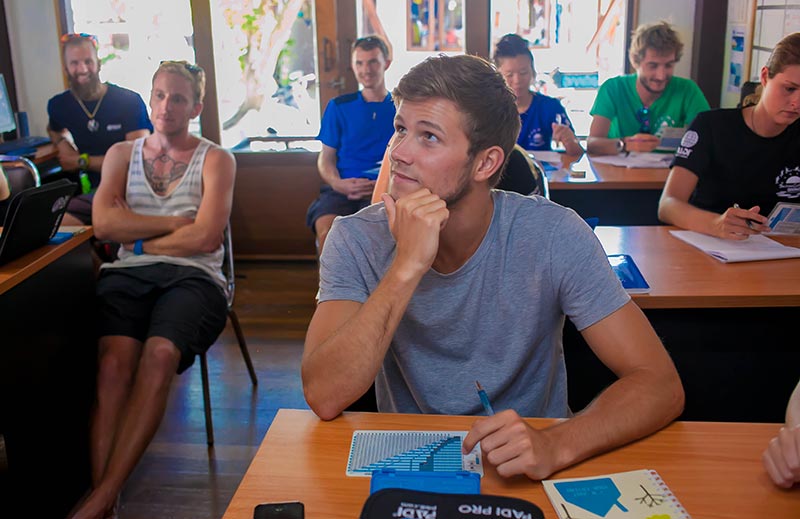
So if someone has done their Divemaster course with such a great PADI Dive Centre, and they have completed an extended PADI Divemaster Internship and they have got the best attention and the highest quality training (like we offer at Sairee Cottage Diving)…then, if you ask me if that person is ready to start the Dive Instructor Development Course straight away then my answer will most likely be: “Yes”. In some cases that individual can even be more qualified than someone who completed a quick and minimal Divemaster course even if that Dive professional has spent years in the dive industry (but just leading divers on fun dives). The PADI IDC is not about leading fun divers or helping to complete courses, it’s about teaching people to dive safely whilst giving them the best time of their lives!
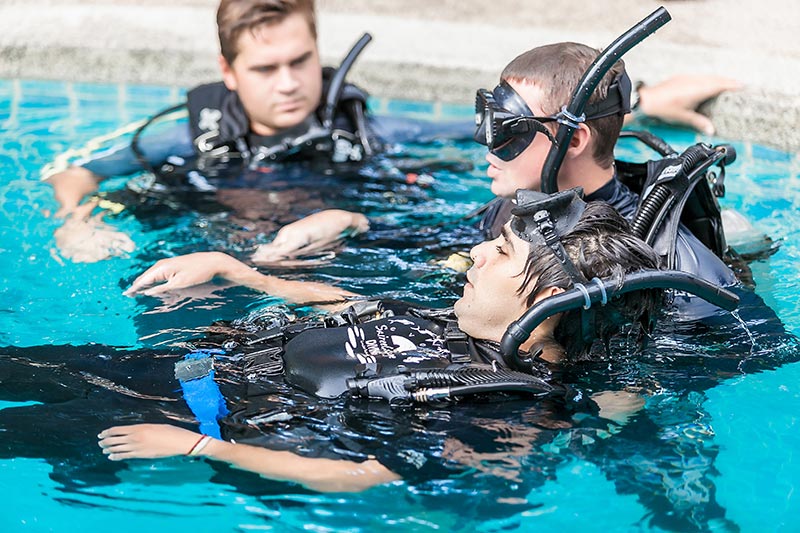
So if you ask me if people who have completed a fantastic Divemaster course who are thinking about joining an equally fantastic IDC: “Do they need more experience before joining the Dive Instructor Development Course?”, then in most cases I say: “No they don’t”.
Individual Confidence and Diving Skills
This relates a lot to the previous point. The confidence and diving skills of a person are linked very closely to the quality of all the dive courses taken to get to the Divemaster Candidate level. These dive courses include the Open Water, Advanced, Rescue and any Specialty courses undertaken. Of course, even with the best instruction and the finest facilities, you still find individuals who need more time than others to fine-tune their dive skills and in-water confidence. Nothing wrong with that, everyone is different. Some students just need more practice than others. With enough time and the right encouragement almost anyone can become a fantastic dive professional.
You need 40 logged dives to start the PADI Divemaster course and 60 logged dives to finish it. To start the PADI Instructor Development Course you need 100 logged dives. This might sound like a lot, which it is for most people, however, some students need a little more to get to the same level. It’s nothing to be ashamed of. As we all know, buoyancy truly gets better with time and experience. Same goes for anything we do in life, practice makes perfect. If a person still lacks good buoyancy or other diving skills, I highly recommend them to get more dive experience before joining an Instructor Development Course, even if that person has the 100 required logged dives.
I know a few amazing Dive Instructors and they have all had some issues with their diving skills during their dive training. But with a little extra practice and the right feedback you might be surprised how quickly you improve.
Diving Skills in Different Waters around the World
When addressing this subject, we need to consider where you learnt how to dive. This time I am not talking about the Dive Centre, I’m talking about the environmental conditions. There is a big difference between a Divemaster or Divemaster trainee who has dived all over the world, especially in some of the more challenging conditions, compared to someone who maybe did all of their training in the same location in pristine seas, e.g. little or no current, minimum waves, good visibility, nice water temperature etc.
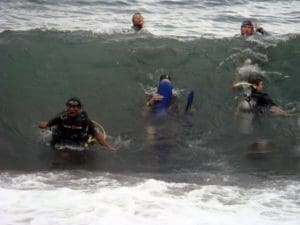 |  |
I have seen some posts on Facebook and Dive Forums saying that the reason for the occasional low quality of new Dive Instructors is because of the quick “Zero to Hero” Instructor packages that can occur in areas with unchallenging dive conditions…. I agree and disagree. It really depends on the individual and where he or she wants to work as a Dive Instructor.
An example might be that a hard-core diver who has dived all over the world in the toughest conditions, truly a very experienced diver, doesn’t automatically make a great teacher. You might have all this great diving experience but you maybe lack Instructing skills or good attitude or experience dealing with a range of students’ needs in a fun and effective way. Of course this goes the other way too. Sometimes Instructors with the best attitude lack the diving experience to teach in more challenging waters.
Teaching new divers in classic places like Koh Tao in Thailand, the Gili Islands in Indonesia or places like Utila in Honduras can be very different to teaching in Europe or North America for example – the customer demographics also differ from area to area. Many of the Dive Instructors there are some of the best in the world because of the hands on experience and sheer numbers of students they have taught and hence the large amount of problems they have experienced and fixed. And many of them did indeed do a “Zero to Hero” package with no training interruptions.
If, however, you are that person with experience of diving in more difficult environments and you are also a great people-person with fantastic teaching skills as well as having worked or trained in busy certification areas like Cairns, Koh Tao, Utila etc. you are, of course, going to be a top level Diving Instructor. (I can see the massive replies to this blog already happening; please do share your thoughts!)
No place in the world is perfect and you can find good and bad Dive Centres, Divemasters and Diving Instructors anywhere, both in busy diving areas and not so busy ones. It’s important to consider the quality of training you received in your Open Water, Advanced, Rescue and Divemaster courses to decide whether or not you are ready to start the IDC straight away or at a later time after some more experience and practice. Location is important, but the Dive Centre and staff quality is much more so.
Other factors that can play a role include the confidence levels of the person that wants to do the Dive Instructor course, their diving skills, finances, attitude and teaching skills.
Finances and Living Cost
Finances can play a big role in making the decision to do the IDC straight away or to wait. I know some people say that finances should play no role in life decisions, but for many it is an important reality and consideration for the plan to become a Divemaster or Dive Instructor.
First of all you need to pay for all the PADI Dive courses, and some are not cheap, however the PADI Divemaster course and the IDC are both investments. You will need to purchase all the teaching materials, pay PADI the application fees and on top of that you need to pay PADI the annual professional membership fee to be able to remain in teaching status and conduct the work we all love so much!

You also need to take into account that whist in training or trying to get more experience as a Dive professional, you will not necessarily be making any money at the time. If you stay in another country you need to factor in your daily expenses. So, in a matter of speaking, the quicker you become a Dive Instructor, the quicker you can start earning your money back. Of course it really depends on where you work. In some places there is more Divemaster work than teaching jobs. Divemasters may even make the same or more money then a Dive instructor. Generally speaking though, in the Dive Industry you usually make a lot more money as a Dive Instructor than as a Divemaster.
Please read this article about how much money a Dive Instructor can make
This doesn’t mean that we should to rush our courses in order to make more money, quite the contrary. If you pick the right Dive Centre, experienced Divemaster Instructors and a quality Divemaster Internship program you will get the best dive training and experience all within a great time frame to get ready for your PADI IDC. We call these “Zero to Hero Packages”, which, at a quality dive school will transform almost non-divers into well-trained Dive Instructors.
Individual Attitude
The right attitude is the most important attribute a Professional PADI Divemaster or Diving Instructor should have.
Some people argue between Language skills or Attitude as being the most important attribute for a Dive professional. Personally, I have been in the dive industry a long time and I can truly say that attitude wins by far. This applies to not only getting a great job, but also keeping it.
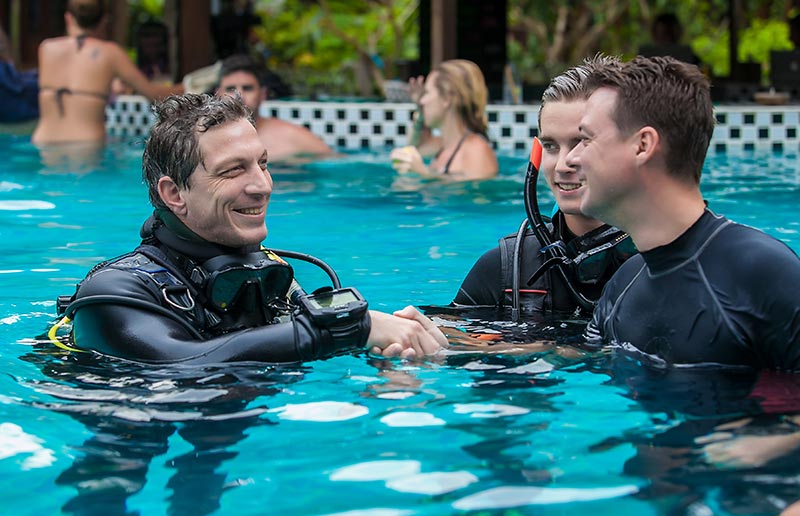
It makes sense that people with a great attitude will be more ready to start a PADI IDC earlier than people who just want to have fun and party, or people who have negative traits, who don’t care about others or the environment or those who only care about the money, etc., etc.…
Sadly enough we sometimes see people showing great attitude during their Divemaster course who actually lose that attitude when working as a Divemaster because they picked the wrong area or Dive Centre to work in. On the other hand we have also witnessed the opposite, where some Divemasters have picked up a much better attitude from their working environment before moving up to the IDC. Again it is different for everyone. Personality, workplace, and geographical area are major factors here.
Don’t forget: The most successful people in the dive industry are those who truly inspire others to have the best attitudes and attributes.
Teaching Skills
During your Divemaster course you will be learning how to lead fun divers, assist in PADI dive courses, conduct PADI Reactivate (refresher) sessions and to be, most of all, a great diving role model. But, what about teaching skills?
Funnily enough, many people think that a PADI Divemaster doesn’t teach. I don’t agree. I think that good Divemaster Candidates and certified Divemasters have many opportunities to teach, and some of them are even better at it than some Instructors! They are just teaching different things than dive instructors.
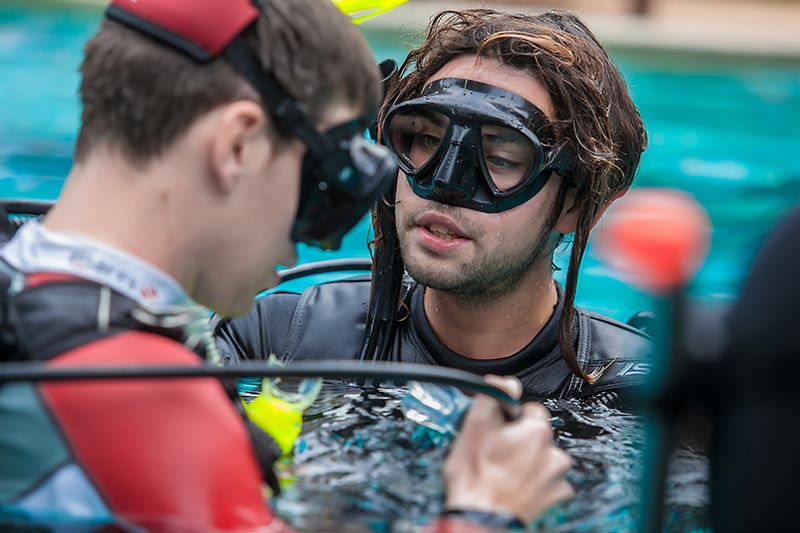
For example, whilst leading a fun dive (PADI Discover Local Diving) a Divemaster is often reminding (re-teaching) customers about equipment set-up, the buddy check routine, local water-entry techniques, surface swims, descents, equalisation, buoyancy, finning techniques, air-checks, computer use, aquatic life and so much more. Whilst assisting a course, the Divemaster may also be helping to teach the PADI RDP tables, computers, dive theory as well as giving important reminders during the dive briefing in case the student didn’t fully understood the Dive Instructor.
In other words, a Divemaster Trainee (DMT) or Candidate (DMC) who is already very good at leading fun divers and assisting courses can happily do the Dive Instructor course (IDC) very soon after becoming a Divemaster, whilst qualified Divemasters that are not so comfortable with leading, assisting etc. will need more time to get that necessary confidence to take the next step in their career, in which case it would be advisable to wait before attending the IDC.
Again it depends on individual persons and the quality of training received.
Quality of the PADI IDC Course
One of the most important factors to decide if someone can do the PADI Dive Instructor IDC course soon or straight after the Divemaster course is the quality of the Instructor Development Course itself, and the time or extra time the PADI Course Director invests in each individual IDC student.
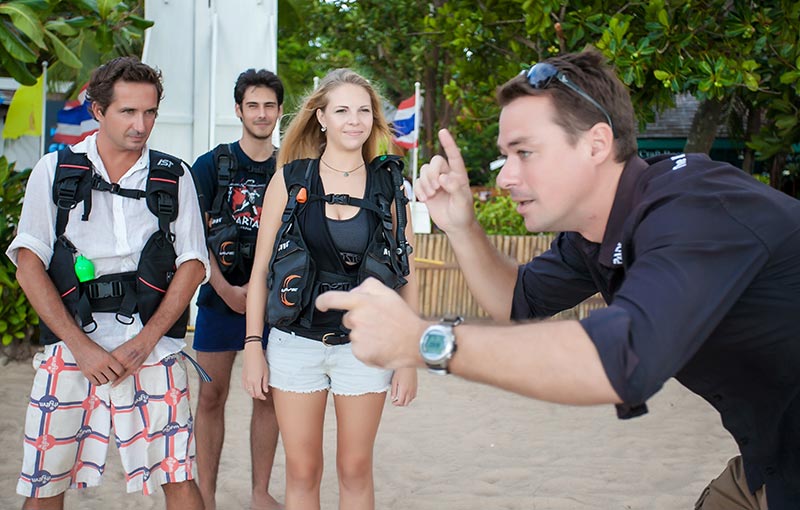
Some Dive Centres will conduct an IDC in just 7 days. For a lot of people this will be too short to not only successfully complete the IDC and Instructor Examination, but also, too short a time to obtain enough experience in the field to acquire or keep a decent dive job. This doesn’t apply to everyone of course, but it can definitely be an issue for some. For this reason some of the best PADI IDC and PADI Career Development Centres (CDC), like Sairee Cottage Diving, make their IDC courses longer. We include extra lectures, extra time, extra skills repetition, extra real life information and much more to ensure the success of our IDC Candidates. If someone chooses one of these high-quality IDC courses then in most cases Divemaster students don’t have to wait that long before starting the IDC course in comparison to a super quick IDC course.
Our packed course includes extra skill circuits, longer IDC lectures, real life scenarios, extra one-on-one tuition, high quality equipment, job placement training, extra business and self-promotion skills, eco and conservation, how to use and inspire passion, detailed risk management lectures and also how to embrace cutting edge teaching technology, whilst maintaining one of the most fundamental aspect in dive training: customer service.
Conclusion
To give the right answer to the question “should a Divemaster who has just passed his or her course wait to get more experience before starting their IDC?”, it depends on many factors including personal situation, individual needs, skill-level, the quality if the Divemaster course, the person’s attitude, the quality of the IDC itself, the geographical location and the quality, dedication and passion of the PADI Course Director.
If you have any doubt about if you are ready for the PADI Diving Instructor Course (IDC) then please contact one of those outstanding PADI IDC or CDC Centres. We at Sairee Cottage Diving are always ready to help in answering your questions and we will give you the best personal advice in deciding if you should start your IDC straight after your Divemaster course, or if we think you should wait.
